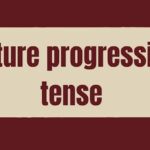The future perfect continuous tense, also known as the future perfect progressive tense, is used to describe an ongoing action ...


The future perfect continuous tense, also known as the future perfect progressive tense, is used to describe an ongoing action ...

The future perfect tense is a verb tense used to describe an action that will be completed or finished at ...

The future progressive tense, also known as the future continuous tense, is used to describe an ongoing action that will ...

The future simple tense, also known as the simple future tense, is a verb tense used to describe actions or ...

The past perfect continuous tense, also known as the past perfect progressive tense, is a verb tense used to describe ...

Past perfect tense is a grammatical tense used to describe an action that occurred before another action in the past. ...

The past progressive tense, also known as the past continuous tense, is a verb tense used to describe ongoing or ...

Tense is a grammatical concept that refers to the time of an action or event described in a sentence. It ...

The past simple tense, also known as the simple past tense, is used to describe completed actions or states in ...

The present perfect continuous tense, also known as the present perfect progressive tense, is a verb tense used to describe ...